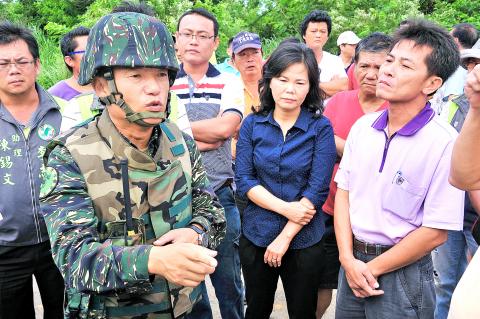The annual Han Kuang military exercises continued yesterday, with combined naval and air force combat maneuvers held off the east coast, and a simulation of the defense of Taichung Harbor from a Chinese attack.
However, live-fire drills and troop movements at a major armed forces base in southern Taiwan met with the protests of local residents.
The protest in southern Taiwan is part of a long-running feud between local residents and the military over the activities of the Joint Operations Training Base Command, which is in Pingtung County’s Checheng Township (車城).

Photo: Tsai Tsung-hsien, Taipei Times
Led by county councilors and township elected officials, more than 200 residents gathered at the entrance of the base yesterday morning and attempted to enter.
The residents wanted to stop the military exercise and the live-fire drills, because they said the noise and the concussive shocks from artillery bombardments have damaged nearby houses and severely affected their living environment.
Pingtung County authorities dispatched several squads of police officers to the scene.
Checheng Township mayor Chang Chun-kuei (張春桂) and County Councilor Lee Chih-wei (李志偉) of the Democratic Progressive Party (DPP) were among the officials who headed the protest and they negotiated with military officials to present residents’ grievances.
Lee said that residents have protested against the base since it was set up to train soldiers in the 1960s, and people have always demanded the base be moved elsewhere.
He and other officials said that many farm houses and buildings nearby the base have sustained cracks and severe deterioration, but the military does not provide residents with financial compensation and has never conducted damage assessment on the areas surrounding the base.
Voicing their demands at the base entrance, one resident said: “[Former vice president] Lien Chan (連戰) has been to China to review the Chinese military parades, so our nation’s armed forces need not hold these drills anymore, which cause difficulties to our daily lives.”
In yesterday’s drill, the army’s engineers corps simulated the placing of explosives on piers and other infrastructure at Taichung Harbor, in the event of incursion by Chinese warships.
In addition, a trainee soldier at the Airborne Special Forces Command base in Tainan was found hanging in his barracks on Tuesday, with military officials saying preliminary findings indicate a suicide.
Military officials said the soldier, surnamed Lin (林), was found hanging from the roof of the barracks on Tuesday afternoon.
He was taken down and emergency services were sent for, but medics were unable to revive him and he was pronounced dead, officials said, adding that Lin’s family were notified.

Taiwan is stepping up plans to create self-sufficient supply chains for combat drones and increase foreign orders from the US to counter China’s numerical superiority, a defense official said on Saturday. Commenting on condition of anonymity, the official said the nation’s armed forces are in agreement with US Admiral Samuel Paparo’s assessment that Taiwan’s military must be prepared to turn the nation’s waters into a “hellscape” for the Chinese People’s Liberation Army (PLA). Paparo, the commander of the US Indo-Pacific Command, reiterated the concept during a Congressional hearing in Washington on Wednesday. He first coined the term in a security conference last

Prosecutors today declined to say who was questioned regarding alleged forgery on petitions to recall Democratic Progressive Party (DPP) legislators, after Chinese-language media earlier reported that members of the Chinese Nationalist Party (KMT) Youth League were brought in for questioning. The Ministry of Justice Investigation Bureau confirmed that two people had been questioned, but did not disclose any further information about the ongoing investigation. KMT Youth League members Lee Hsiao-liang (李孝亮) and Liu Szu-yin (劉思吟) — who are leading the effort to recall DPP caucus chief executive Rosalia Wu (吳思瑤) and Legislator Wu Pei-yi (吳沛憶) — both posted on Facebook saying: “I

The Ministry of Economic Affairs has fined Taobao NT$1.2 million (US$36,912) for advertisements that exceed its approved business scope, requiring the Chinese e-commerce platform to make corrections in the first half of this year or its license may be revoked. Lawmakers have called for stricter enforcement of Chinese e-commerce platforms and measures to prevent China from laundering its goods through Taiwan in response to US President Donald Trump’s heavy tariffs on China. The Legislative Yuan’s Finance Committee met today to discuss policies to prevent China from dumping goods in Taiwan, inviting government agencies to report. Democratic Progressive Party Legislator Kuo Kuo-wen (郭國文) said

The Ministry of Economic Affairs has fined Taobao NT$1.2 million (US$36,900) for advertisements that exceeded its approved business scope and ordered the Chinese e-commerce platform to make corrections in the first half of this year or its license would be revoked. Lawmakers have called for stricter supervision of Chinese e-commerce platforms and more stringent measures to prevent China from laundering its goods through Taiwan as US President Donald Trump’s administration cracks down on origin laundering. The legislature’s Finance Committee yesterday met to discuss policies to prevent China from dumping goods in Taiwan, inviting government agencies to report on the matter. Democratic Progressive Party